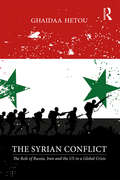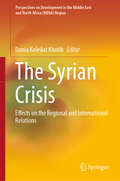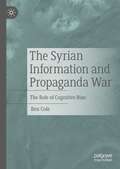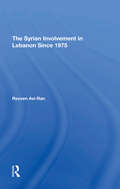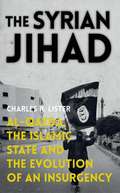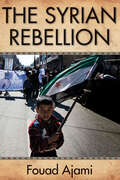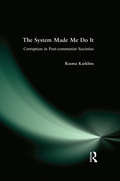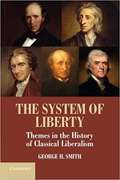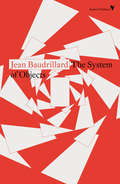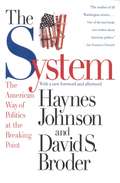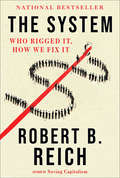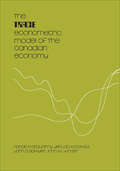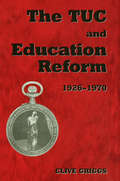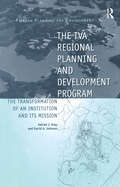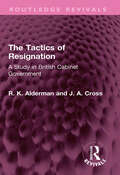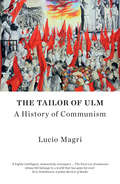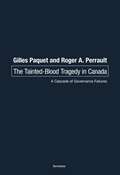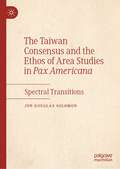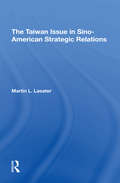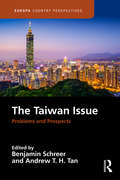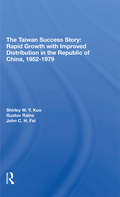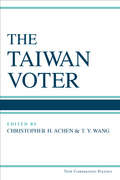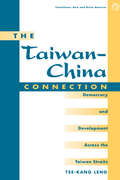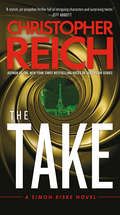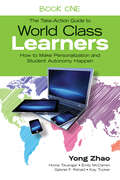- Table View
- List View
The Syrian Conflict: The Role of Russia, Iran and the US in a Global Crisis
by Ghaidaa HetouThis book explores the global impact of the Syrian conflict, and the roles of Russia, Iran and the US in its wake. It looks closely at origins of political turmoil in the Middle East and North Africa (MENA) region by analysing the growing influence of Russia and Iran – militarily, economically and diplomatically – juxtaposed against US defense and national interests. The book: challenges the conventional scholarship to show how non-democratic states such as Russia, Iran and China exhibit a consistent strategic intent in their foreign-policy-making; underlines the convergence of Syrian foreign policy with Russia’s (the USSR before 1989) and Iran’s regional outlook post-1979; takes stock of the shifts in the US foreign policy in MENA in light of new realities. Drawing on detailed fieldwork and archival material, including National Security Archival documents, this book is a tour de force in understanding global politics and contemporary history. It will be indispensable to scholars and researchers of politics and international relations, political theory, foreign policy, Middle East studies, and peace and conflict studies.
The Syrian Crisis: Effects on the Regional and International Relations (Perspectives on Development in the Middle East and North Africa (MENA) Region)
by Dania Koleilat KhatibThis book analyzes the impact and relevance of the Syrian crisis on regional and international relations. Developing into a proxy war, the Syrian crisis has been a battleground for regional dominance. It has also created an opportunity for new states to emerge on the world affairs scene. Russia, for instance, had been keeping a low profile since the fall of the Soviet Union, but took a leading role in the Syrian crisis reasserting itself against the West regionally. The Syrian crisis has also been a catalyst in reshaping many interstate relations and allowing countries such as Russia, Iran, Turkey and China to play an increasingly important geopolitical role. There have been many international ramifications to the Syrian crisis. While the crisis led to an Iranian-Russian rapprochement, it was also a catalyst to more cooperation between Russia and Saudi Arabia; more importantly, it also forced states with opposing views about the crisis -- Turkey, Iran and Russia -- to forge an alliance. Further, the crisis created tensions between the US and Turkey with China on the one hand balancing its interests between the Gulf and Iran whilst focusing on its ambitious Belt and Road Initiative and trying on the other hand to contain Islamic militancy in Syria. The book looks at issues that are usually ignored when discussing Syria such as the strategic control over its hydrocarbon resources, as well as the power of propaganda in portraying realities. It features the use of non-state actors by regional competing powers and the role of local councils in stabilizing the country. The edited volume brings together contributions by authors with different backgrounds who present conflicting views reflecting the divergence between the various stakeholders about the Syrian crisis.
The Syrian Information and Propaganda War: The Role of Cognitive Bias
by Ben ColeThis book focuses on the propaganda war between the Syrian government and the opposition movement, which excludes the Islamic State and the Kurdish-led SDF. Drawing on international relations, psychology, and media studies, the book encourages readers to question the dominant discourse on the war. The core of the book outlines the propaganda battles over the main paradigms and narratives that framed the war, exploring the shortcomings of those paradigms and narratives, identifying who won the propaganda war and why, and assessing what impact it had on the military side of the war. In particular, it focuses on the role of cognitive bias amongst primary and secondary sources in determining the outcome of the propaganda war, and whether the influence of this propaganda is best explained by effects or limited effects theory. Through explaining the dynamics of the propaganda war, the book encourages readers to critically question the dominant discourse on the war, assists them in understanding primary and secondary reporting on the war, and shows that the impact of the propaganda war is best understood in terms of limited effects theory. The book's main findings are that: i) the opposition won the international propaganda war but failed to win the propaganda war inside Syria; ii) propaganda had relatively little effect on shaping attitudes either inside Syria or internationally (instead, its main effect was to reinforce attitudes that had already been shaped by other factors); and iii) the reality of the war lies between the conflicting paradigms and narratives being promoted by each side.
The Syrian Involvement In Lebanon Since 1975
by Reuven Avi-ranThis book is a comprehensive examination of the Syrian involvement in the Lebanese crisis. It focuses on the Syrian interests in Lebanon, the motivation of the Assad regime for intervening in the Lebanese crisis, and the pattern of Syrian actions in Lebanon.
The Syrian Jihad: Al-Qaeda, the Islamic State and the Evolution of an Insurgency
by Charles R. ListerThe eruption of the anti-Assad revolution in Syria has had many unintended consequences, among which is the opportunity it offered Sunni jihadists to establish a foothold in the heart of the Middle East. That Syria's ongoing civil war is so brutal and protracted has only compounded the situation, as have developments in Iraq and Lebanon. Ranging across the battlefields and international borders have been dozens of jihadi Islamist fighting groups, of which some coalesced into significant factions such as Jabhat al Nusra and the Islamic State. <p><p> This book assesses and explains the emergence since 2011 of Sunni jihadist organizations in Syria's fledgling insurgency, charts their evolution and situates them within the global Islamist project. Unprecedented numbers of foreign fighters have joined such groups, who will almost certainly continue to host them. Thus, external factors in their emergence are scrutinized, including the strategic and tactical lessons learned from other jihadist conflict zones and the complex interplay between Al-Qaeda and the Islamic State and how it has influenced the jihadist sphere in Syria. Tensions between and conflict within such groups also feature in this indispensable volume.
The Syrian Rebellion
by Fouad AjamiFouad Ajami offers a detailed historical perspective on the current rebellion in Syria. Focusing on the similarities and differences in skills between former dictator Hafez al-Assad and his successor son, Bashar, Ajami explains how an irresistible force clashed with an immovable object: the regime versus people who conquered fear to challenge a despot of unspeakable cruelty.
The System Made Me Do it: Corruption in Post-communist Societies
by Rasma KarklinsStrike up a conversation with a citizen from the post-communist region and invariably the talk will turn to the topic of corruption - the misuse of public power for private gain. People are sure that corruption is widespread, whether from their own experiences or stories they have heard from others. They feel frustrated that there seems to be nothing they can do about it, that they are helpless, and that they are being played for fools. And many are cynical: they feel that they, too, have to play the game because "the system" compels them to do so. But what system exactly? What are the structures and mechanisms of corruption in post-communist societies? "The System Made Me Do It" is the first comprehensive study of the origin, nature, and consequences of corruption in post-communist societies. While international actors decry corruption as a major impediment to democracy building and economic development, the problem is not well understood. This book fills that gap, and suggests innovative and practical institutional strategies for containing corruption. It achieves a rare and perfect balance of disciplined analysis, practicality, and passion.
The System of Liberty
by George H. SmithLiberal individualism, or "classical liberalism" as it is often called, refers to a political philosophy in which liberty plays the central role. This book demonstrates a conceptual unity within the manifestations of classical liberalism by tracing the history of several interrelated and reinforcing themes. Concepts such as order, justice, rights, and freedom have imparted unity to this diverse political ideology by integrating context and meaning. However, they have also sparked conflict, as classical liberals split on a number of issues, such as legitimate exceptions to the "presumption of liberty," the meaning of "the public good," natural rights versus utilitarianism, the role of the state in education, and the rights of resistance and revolution. This book explores these conflicts and their implications for contemporary liberal and libertarian thought.
The System of Objects (Latin American And Iberian Studies)
by Jean BaudrillardThe System of Objects is a tour de force—a theoretical letter-in-a-bottle tossed into the ocean in 1968, which brilliantly communicates to us all the live ideas of the day.Pressing Freudian and Saussurean categories into the service of a basically Marxist perspective, The System of Objects offers a cultural critique of the commodity in consumer society. Baudrillard classifies the everyday objects of the &“new technical order&” as functional, nonfunctional and metafunctional. He contrasts &“modern&” and &“traditional&” functional objects, subjecting home furnishing and interior design to a celebrated semiological analysis. His treatment of nonfunctional or &“marginal&” objects focuses on antiques and the psychology of collecting, while the metafunctional category extends to the useless, the aberrant and even the &“schizofunctional.&” Finally, Baudrillard deals at length with the implications of credit and advertising for the commodification of everyday life.The System of Objects is a tour de force of the materialist semiotics of the early Baudrillard, who emerges in retrospect as something of a lightning rod for all the live ideas of the day: Bataille&’s political economy of &“expenditure&” and Mauss&’s theory of the gift; Reisman&’s lonely crowd and the &“technological society&” of Jacques Ellul; the structuralism of Roland Barthes in The System of Fashion; Henri Lefebvre&’s work on the social construction of space; and last, but not least, Guy Debord&’s situationist critique of the spectacle.
The System: The American Way of Politics at the Breaking Point
by Haynes Johnson David S. BroderTaking as an example the Clinton health care reform initiative, the authors show how a policy that aimed to please everyone ended by satisfying no one due to pressure groups, political gamesmanship and the inertia of the American 'system'.
The System: Who Rigged It, How We Fix It
by Robert ReichFrom the best-selling author of Saving Capitalism and The Common Good, an urgent analysis of how the "rigged" systems of American politics and power operate, how this status quo came to be, and how average citizens can enact change. <P><P>Millions of Americans have lost confidence in our political and economic system. <P><P>After years of stagnant wages, volatile job markets, and an unwillingness by those in power to deal with profound threats such as climate change, there is a mounting sense that the system is fixed, serving only those select few with enough money to secure a controlling stake. With the characteristic clarity and passion that has made him a central civil voice, Robert B. Reich shows how wealth and power have interacted to install an elite oligarchy, eviscerate the middle class, and undermine democracy. <P><P> Using Jamie Dimon, the chairman and CEO of JPMorgan Chase as an example, Reich exposes how those at the top propagate myths about meritocracy, national competitiveness, corporate social responsibility, and the "free market" to distract most Americans from their accumulation of extraordinary wealth, and power over the system. <P><P>Instead of answering the call to civic duty, they have chosen to uphold self-serving policies that line their own pockets and benefit their bottom line. Reich's objective is not to foster cynicism, but rather to demystify the system so that we might instill fundamental change and demand that democracy works for the majority once again. <P><P><b>A New York Times Bestseller</b>
The TRACE Econometric Model of the Canadian Economy
by John A. Sawyer John W.L. Winder Nanda K. Choudhry Yehuda KotowitzThe TRACE (Toronto annual Canadian econometric) model is an annual, non-linear econometric model of the Canadian economy designed primarily to forecast the statistics which appear in the principal tables of the Canadian National Income and Expenditure Accounts. TRACE is the first Canadian econometric model from which a published ex ante forecast has been made. In this book the authors describe the model and a high-speed computer. They show how the effects of alternative combinations of federal government policies can be examined by producing sets of conditional forecasts from the model. Both impact and long-run multiplier effects of changes in fiscal and monetary policy are derived from simulation experiments performed with the model. The results show the different effects that are obtained under régimes of fixed and floating foreign exchange rates. The book presents the economic theory underlying the model and provides information on estimates of the structural parameters of the Canadian economy. It will be of interest to those engaged in economic forecasting and policy analysis, as well as those studying macro-economic theory and econometric methods.
The TUC and Education Reform, 1926-1970 (Woburn Education Series)
by Dr Clive Griggs Clive GriggsThis book covers a crucial period for the development of state education in Britain; the advent of the comprehensive debate before and during the Second World War; the War years themselves and the 1944 Education Act; the post-War Labour Government; and Churchill's last government in a time of education expansion. From the 1960s, the focus shifted to questions of social deprivation and educational opportunities, secondary school selection, the debate on standards, Robbins and higher education, and the continuing theme of the dominance of public schools.The book is divided into four sections, which are then divided into chapters. Each chapter takes as its main reference point a key issue within the chronological framework of the book, e.g. resistance to secondary education for all, politics and textbooks, multilateral and technical schools, pressure groups and the 1944 Education Act, Churchill and the Conservatives. Much new light is thrown on the topics by the author's use of new material and he has made a valuable contribution to the politics of education.
The TVA Regional Planning and Development Program: The Transformation of an Institution and Its Mission (Urban Planning and Environment)
by David A. JohnsonThe Tennessee Valley Authority (TVA) is a world-renowned model for regional planning and development. Based along the Tennessee River and its series of hydro-electric power stations, dams and reservoirs, the TVA development program envisioned a broad regional planning program. The program focused on development opportunities and problems around the array of TVA dams and their reservoirs. It also created new 'model' towns and pioneered land-use planning bringing together federal, state, and local agencies, farmers, foresters and industrial firms to further the economic, social, and physical conditions of what had been one of the most seriously lagging regions of the U.S. This book is based on the memoirs and experiences of Aelred J. Gray, former planner with the TVA, who saw the 'big picture' and introduced much of the pioneering work of the agency. Gray worked as a staff planner at the TVA for nearly 40 years including a decade as its chief planner, overseeing numerous changes and developments to the Authority's program. As well as building up the regional industrial development and the foundation of state parks, he also had a strong interest in the region's cities. In the 1950s he introduced TVA's landmark Flood Prevention Program, which became a national model. His review of how this innovative and influential regional development agency functioned and changed through the decades will be of value to all those interested in planning practice, planning history, and regional politics.
The Tactics of Resignation: A Study in British Cabinet Government (Routledge Revivals)
by R. K. Alderman J. A. CrossFirst Published in 1967 the Tactics of Resignation examines the principles of collective and individual ministerial responsibility and investigates the parallel problems related to the shadow cabinet in Britain. It raises pertinent questions like: why do so many hold their peace and support policies of which they privately disapprove? Loss of confidence in the House of Commons should involve individual resignation. How have so many ministers been able to hang on in the face of adverse criticism or apparent inefficiency? This book is a valuable addition to understand the difference between traditional principles and actual British government. It is an interesting read for students of British government and politics.
The Tailor of Ulm: A History of Communism
by Lucio MagriTwenty years have passed since the Italian Communists’ last Congress in 1991, in which the death of their party was decreed. It was a deliberate death, accelerated by the desire for a "new beginning." That new beginning never came, and the world lost an invaluable, complex political, organizational and theoretical heritage.In this detailed and probing work, Lucio Magri, one of the towering intellectual figures of the Italian Left, assesses the causes for the demise of what was once one of the most powerful and vibrant communist parties of the West. The PCI marked almost a century of Italian history, from its founding in 1921 to the partisan resistance, the turning point of Salerno in 1944 to the de-Stalinization of 1956, the long ’68 to the "historic compromise," and to the opportunity—missed forever—of democratic transformation.With rigor and passion, The Tailor of Ulm merges an original and enlightening interpretation of Italian communism with the experience of a militant "heretic" into a riveting read—capable of broadening our insights into contemporary Italy, and the twentieth-century communist experience.
The Tainted-Blood Tragedy in Canada: A Cascade of Governance Failures
by Gilles Paquet M. Roger A. PerraultThis book revisits the tainted blood tragedy that Canada experienced in the latter part of the 20th century. It presents an argument in brief about the tragedy being the result of a cascade of pathologies of governance. Then it challenges the conventional wisdom and its explanation boiling down to four ill-founded accusations. After proposing a systemic reconstruction of the tragedy, it develops some responses to the systemic governance failures. The conclusion takes stock of the modest progress in the repairs of the toxic system in place, and the postface focuses on the demise of critical thinking as a fundamental source of the crisis and on a need to refurbish critical thinking if advances are to be expected in what remains a work in progress.
The Taiwan Consensus and the Ethos of Area Studies in Pax Americana: Spectral Transitions
by Jon Douglas SolomonThis book constitutes a timely intervention into debates over the status of Taiwan, at a moment when discussions of democracy and autocracy, imperialism and agency, unipolarity and multipolarity, dominate the intellectual agenda of the day. Pursuing a parallel trajectory that is both epistemic and historical, that is traced out in relation both to Taiwan’s recent history and to the disparate forms of knowledge production about that history, this work engages in scholarly debate about some of the burning issues of our time, including transitional justice, hegemony and conspiracy in the digital age, debt regimes, cultural difference, national language, and the traumatic legacies of war, colonialism, anticommunism, antiblackness, and neoliberalism. Providing trenchant analyses of the fundamental bipolarity that persists amidst both unipolar and multipolar conceptions of the world schema inherited from the colonial-imperial modernity, this book will be of interest to scholars in many fields, including translation studies, postcolonial studies, Marxism studies, trauma studies, media studies, poststructural theory, gender studies, cold war studies, area studies, American studies, black studies, and so forth.
The Taiwan Issue In Sino-american Strategic Relations
by Martin L LasaterThe first two years of the Reagan administration saw a close correlation between improved unofficial relations between Washington and Taipei and a deterioration of strategic cooperation between Washington and Beijing. These developments led many U.S. officials and scholars to conclude that U.S. security interests may require periodic concessions over Taiwan to ensure China ‘s cooperation in countering the Soviet threat. Rejecting this view, Mr. Lasater argues that Washington’s and Beijing’s bilateral relations with Moscow and not the Taiwan issue are the key international determinants of Sino-American strategic cooperation. Examining the parameters of that cooperation and the role of Taiwan in Sino-American relations, Mr. Lasater suggests that Beijing is deliberately using U.S. security concerns to seek concessions on Taiwan and other issues. He advises a policy that stands firm in negotiations with the Chinese and that resists the temptation to make politically expedient concessions--a more balanced course of action whereby improved relations with Beijing are sought concurrently with the maintenance of friendly, unofficial ties with Taipei.
The Taiwan Issue: Problems and Prospects (Europa Country Perspectives)
While global attention has been focused on other regional issues, such as China-US tensions and North Korea’s nuclear ambitions, little attention has been paid to Taiwan. Yet the so-called Taiwan issue, namely the continued separation of the island from mainland China, remains a major regional security challenge that could potentially spark direct conflict involving the USA, China and Japan, the three largest economies in the world, two of which are nuclear powers. Although Taiwan has continued to find opportunities to maintain the current status quo despite a deteriorating geo-strategic environment as a result of the rise of China and the uncertainties of the Trump Administration, its room for manoeuvre continues to narrow. This volume examines the challenges and evaluates the prospects for preventing conflict on the Taiwan Strait, by focusing on the political conditions that Taiwan faces internally and externally.
The Taiwan Success Story: Rapid Growith With Improved Distribution In The Republic Of China, 1952-1979
by Gustav Ranis Shirley W KuoEconomists and policymakers have long been perplexed over the way rapid growth appears to conflict with the other common goal of developing nations - more equitable income distribution. But economic expansion need not preclude equity, as demonstrated by the case of Taiwan, which experienced high rates of economic growth between the early 1950s and the late 1970s while simultaneously improving the distribution of income among its people. This book describes how the Republic of China managed this balancing of goals and analyzes the reasons for Taiwan's exceptional performance. The authors illustrate how full utilization of the country's vast human resources through emphasis on labor-intensive production has worked to make Taiwan's products competitive in international markets and to make fiscal redistribution after the fact unnecessary. They also cite Taiwan's early attention to land reform, to productivity in agriculture, and to the spread of decentralized rural industry as important factors in the country's achievements. They point out that, although the specifics may change, strategies and policy implications drawn from the Taiwan experience should be applicable in other developing countries.
The Taiwan Voter
by Christopher Henry Achen T. Y. WangThe Taiwan Voter examines the critical role ethnic and national identities play in politics, utilizing the case of Taiwan. Although elections there often raise international tensions, and have led to military demonstrations by China, no scholarly books have examined how Taiwan’s voters make electoral choices in a dangerous environment. Critiquing the conventional interpretation of politics as an ideological battle between liberals and conservatives, The Taiwan Voter demonstrates in Taiwan the party system and voters’ responses are shaped by one powerful determinant of national identity—the China factor. Taiwan’s electoral politics draws international scholarly interest because of the prominent role of ethnic and national identification. While in most countries the many tangled strands of competing identities are daunting for scholarly analysis, in Taiwan the cleavages are powerful and limited in number, so the logic of interrelationships among issues, partisanship, and identity are particularly clear. The Taiwan Voter unites experts to investigate the ways in which social identities, policy views, and partisan preferences intersect and influence each other. These novel findings have wide applicability to other countries, and will be of interest to a broad range of social scientists interested in identity politics.
The Taiwan-china Connection: Democracy And Development Across The Taiwan Straits (Transitions: Asia And Asian America Ser.)
by Tse-Kang LengExploring the transitional role of the state in Taiwan's economic development, this book focuses especially on the impact of trade with mainland China. Tse-Kang Leng argues that the basic structure of political forces within Taiwan and its pattern of external economic relations have been transformed in the 1990s, with cross-Straits trade playing a key part. Although politically embarrassing to the government, this trade provides an economic opportunity that is irresistibly attractive to business interests.Thus, cross-Straits trade and investment have served as a fulcrum by which societal interests have moved an unwilling state. Going beyond the ?strong state? paradigm, the author's analysis of current cross-Straits economic policies reveals a sharp contrast between Taiwan's authoritarian past and its current era of democratization. Weighing the crucial forces at work in Taiwan?democratization, state-society interaction, and economic interdependence with mainland China?Leng provides a thorough analysis of Taiwan's political and economic development in the 1990s and beyond.
The Take (Simon Riske #1)
by Christopher ReichFrom New York Times bestselling author Christopher Reich, an international spy thriller featuring Simon Riske: one part James Bond, one part Jack ReacherRiske is a freelance industrial spy who, despite his job title, lives a mostly quiet life above his auto garage in central London. He is hired to perform the odd job for a bank, an insurance company, or the British Secret Service, when he isn't expertly stealing a million-dollar watch off the wrist of a crooked Russian oligarch.Riske has maintained his quiet life by avoiding big, messy jobs; until now. A gangster by the name of Tino Coluzzi has orchestrated the greatest street heist in the history of Paris: a visiting Saudi prince had his pockets lightened of millions in cash, and something else. Hidden within a stolen briefcase is a secret letter that could upend the balance of power in the Western world. The Russians have already killed in an attempt to get it back by the time the CIA comes knocking at Simon's door.Coluzzi was once Riske's brother-in-arms, but their criminal alliance ended with Riske in prison, having narrowly avoided a hit Coluzzi ordered. Now, years later, it is thief against thief, and hot on their trail are a dangerous Parisian cop, a murderous Russian femme fatale, her equally unhinged boss, and perhaps the CIA itself.In the grand tradition of The Day of the Jackal and The Bourne Identity, Christopher Reich's The Take is a stylish, breathtaking ride.
The Take-Action Guide to World Class Learners Book 1: How to Make Personalization and Student Autonomy Happen
by Yong Zhao Homa S. Tavangar Emily E. McCarren Gabriel F. Rshaid Kay F. TuckerYour blueprint to entrepreneur-minded schooling The Take-Action Guide to World Class Learners series provides the most complete information available on designing twenty-first century schools poised to leapfrog into the future! These practice-oriented books expand on Dr. Yong Zhao’s acclaimedWorld Class Learners, which presents a new framework for cultivating creative and entrepreneurial students. Now, with this first book in the follow-up three-volume set, Zhao digs much deeper, revealing how exactly to put that framework into effect. This first book in the series provides specific strategies and practical advice on how to Incorporate student choice for flexible, student-focused curriculum Motivate students to turn strengths into passions Cultivate students’ technical, creative, decision making, and communication skills Implement Zhao’s new paradigm shift one phase at a time, starting with Book 1. Better yet, read all three volumes for a complete blueprint to entrepreneur-minded schooling. "The ideal school should provide opportunities and resources to enable students to personalize their educational experiences instead of receiving a uniform standardized, externally prescribed, education diet." --Yong Zhao
